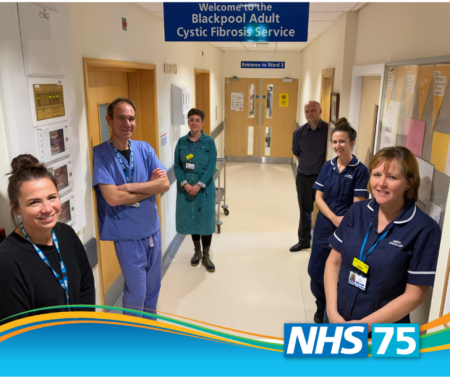Publish date: 26 April 2023

Until very recently people with cystic fibrosis (CF) were not expected to live past the age of 20.
CF is a lethal genetic condition that causes thick mucus to build up in the lungs, digestive tract and other parts of the body but a new drug treatment is transforming the lives of 90 per cent of patients.
It is just one of the many transformative drug breakthroughs that have revolutionised care since the NHS was founded in 1948.
Nearly three-quarters of local patients with cystic fibrosis are also benefiting from home-monitoring of their condition thanks to the work of Blackpool Adult Cystic Fibrosis Service.
CF patients were particularly vulnerable to infection during the Covid-19 pandemic and often unable to leave their homes for medical appointments.
“We had to run video and telephone clinics instead of seeing people face-to-face,” said Service Director Dr Tarek Saba, who leads the team. “These were very popular with patients – in fact, we had higher clinic attendances online that we had in-person before the pandemic.
“But the problem was we couldn’t make the usual face-to-face observations which give us essential data about how patients’ condition is progressing.”
As Covid restrictions were lifted, Dr Saba’s team were supported by the Trust’s Clinical Quality Academy to work out how they could keep the convenience of remote care but restore the observations.
They did this by successfully applying for NHS community funding to pay for a range of clinical technology, such as diabetic sensors and blood monitors, which allow patients to monitor themselves at home and send the data to the CF team.
“We have nearly 75% of patients now doing their own monitoring,” said Dr Saba.
Jamie has been a patient at Blackpool for many years. Pre-pandemic he regularly had to make a nearly 100-mile, inconvenient round trip from home to hospital for his check-ups. He says the pandemic changed all that and the new remote-monitoring service has allowed him to move away to Cambridge “but still keep the team at Blackpool caring for me and who know me so well”.
Dr Saba added: “Patients like being in control and having a sense of ownership over their condition. It will be interesting to see over the longer term if this approach also improves patients’ overall management of their condition.
“Covid was a terrible time for so many people but at least on this occasion some good has come of it – and with the new drug treatment patients can look forward to a much more normal life.”



